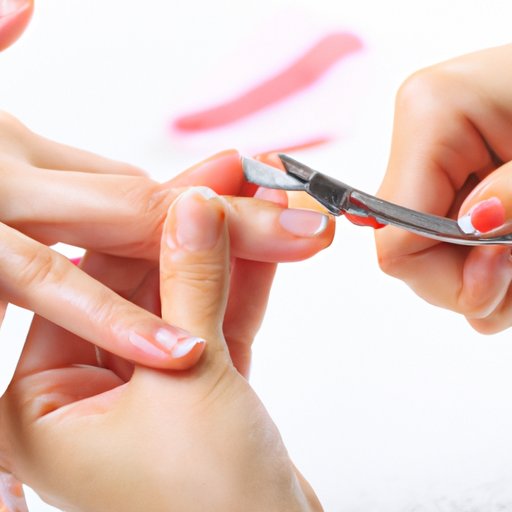
Introduction
Hangnails are pesky little pieces of skin that can become a painful nuisance if not taken care of properly. These tiny flaps of skin, located at the base of the nail bed, can cause discomfort and even lead to infection if not treated promptly. In this article, we’ll discuss the causes of hangnails and provide some tips and tricks for getting rid of them.
Causes of Hangnails
Hangnails are often caused by exposure to harsh chemicals, such as those found in cleaning products, or by extreme weather conditions, such as cold and dry air. Not caring for your nails and cuticles or biting your nails can also lead to hangnails. It’s important to take care of hangnails, as leaving them untreated can lead to infection and further damage to the skin around the nail.
Trimming Hangnails
When it comes to trimming hangnails, it’s important to do it properly to avoid causing further damage or infection. Start by washing your hands with soap and warm water to prevent the spread of bacteria then gently use a pair of cuticle scissors or nail trimmers to clip the hangnail as close to the base as possible. Avoid pulling the hangnail to prevent further damage or tearing of the skin, as this can lead to infection. It’s also important to use clean tools to avoid introducing bacteria to the area, which can cause infection.
Moisturizing and Hydrating the Skin
Keeping your skin and cuticles hydrated is a key factor in preventing hangnails. Applying cuticle oil or a moisturizing lotion on a regular basis can keep the skin around your nails healthy and prevent the occurrence of hangnails. These products can also promote healthy nail growth and improve the overall appearance of your nails.
Avoiding Harsh Chemicals and Excessive Hand Washing
Excessive hand washing and exposure to harsh chemicals can cause the skin around your nails to dry out, leading to the formation of hangnails. When possible, wear protective gloves or avoid contact with harsh chemicals to reduce your risk of developing hangnails. Additionally, try to avoid over-washing your hands if possible. Opt for a moisturizing soap and apply lotion after washing to keep your skin hydrated.
Protective Measures
If your lifestyle or work involves activities that can lead to hangnails, such as washing dishes or working with chemicals, it’s important to take protective measures. Consider wearing gloves or protective hand coverings when doing these types of activities to reduce your risk of developing hangnails.
Recognizing Signs of Infection and Seeking Medical Attention
In some cases, hangnails can lead to infection, which can cause pain, swelling, and redness around the affected area. If you notice any signs of infection, such as pus or drainage, seek medical attention to prevent further complications. Additionally, if you have an underlying medical condition, such as diabetes, which affects your circulation and immunity, it’s important to seek medical attention promptly, as hangnails can pose a greater risk of infection in these individuals.
Conclusion
Hangnails may seem like a minor nuisance, but if not taken care of properly, they can lead to painful infections and damage to the skin around the nail. To prevent hangnails, it’s important to keep your skin and cuticles hydrated, avoid exposing your hands to harsh chemicals and excessive washing, and take protective measures when necessary. By following these tips and seeking medical attention when necessary, you can keep your hands healthy and free of hangnails.




